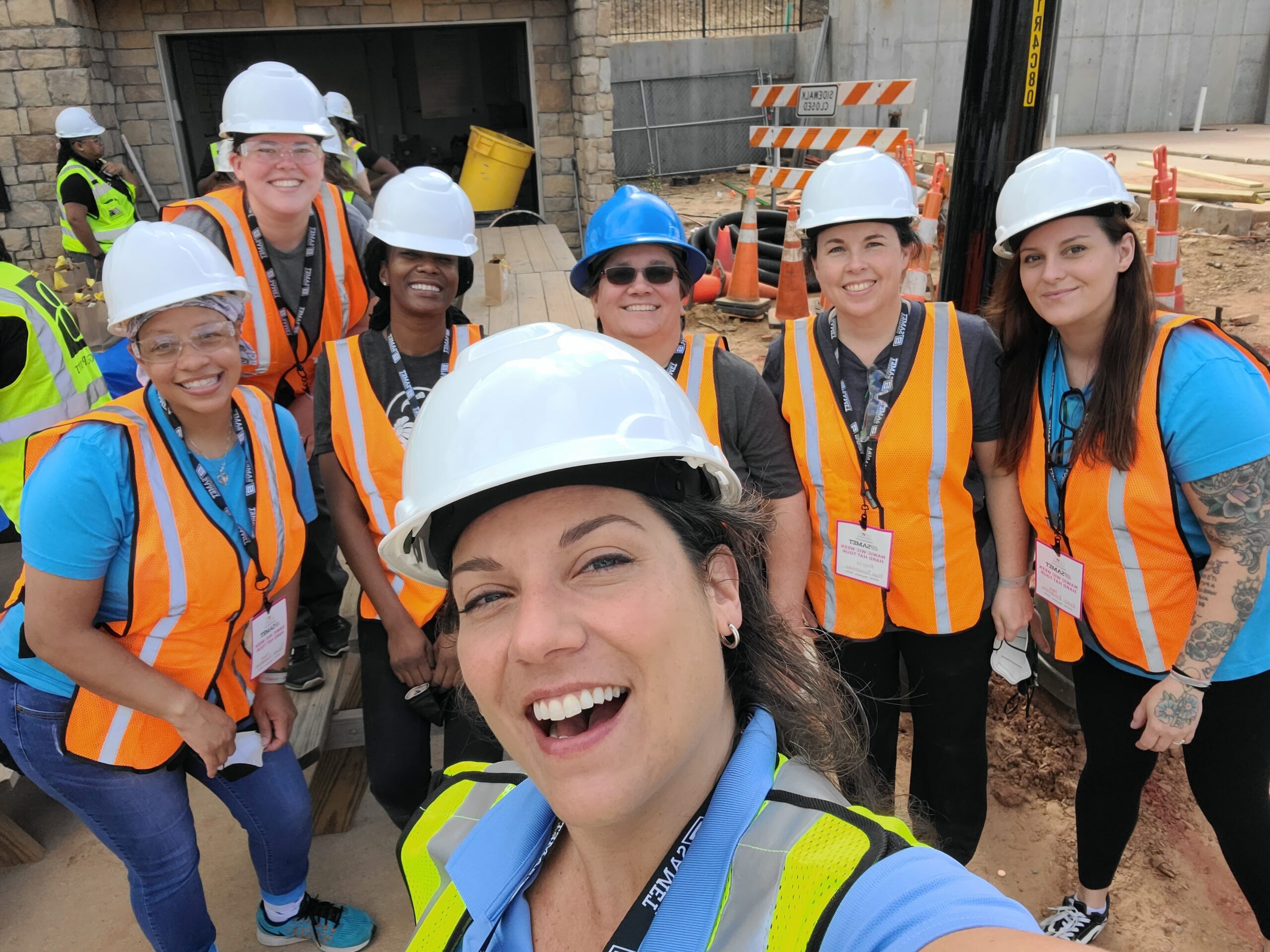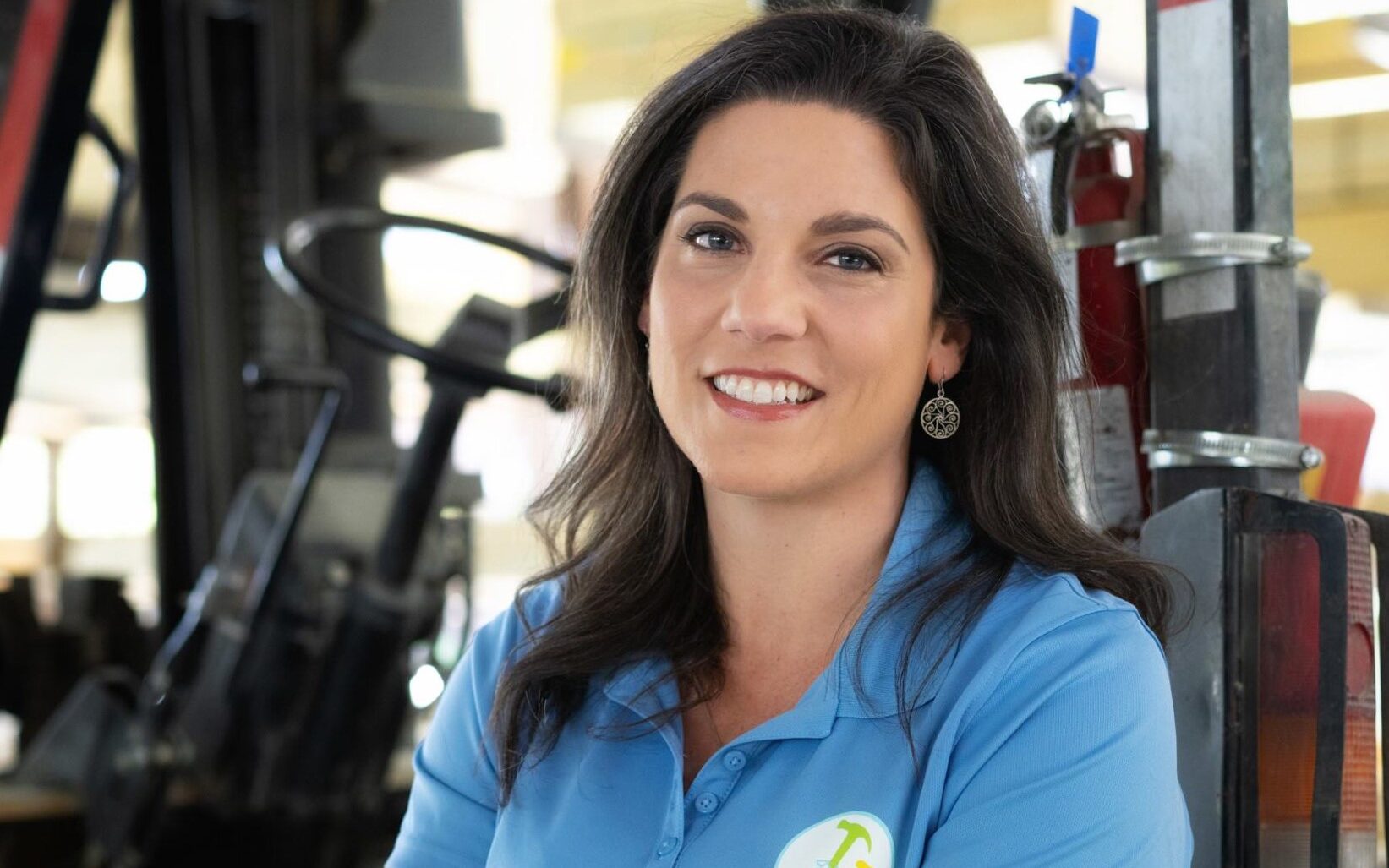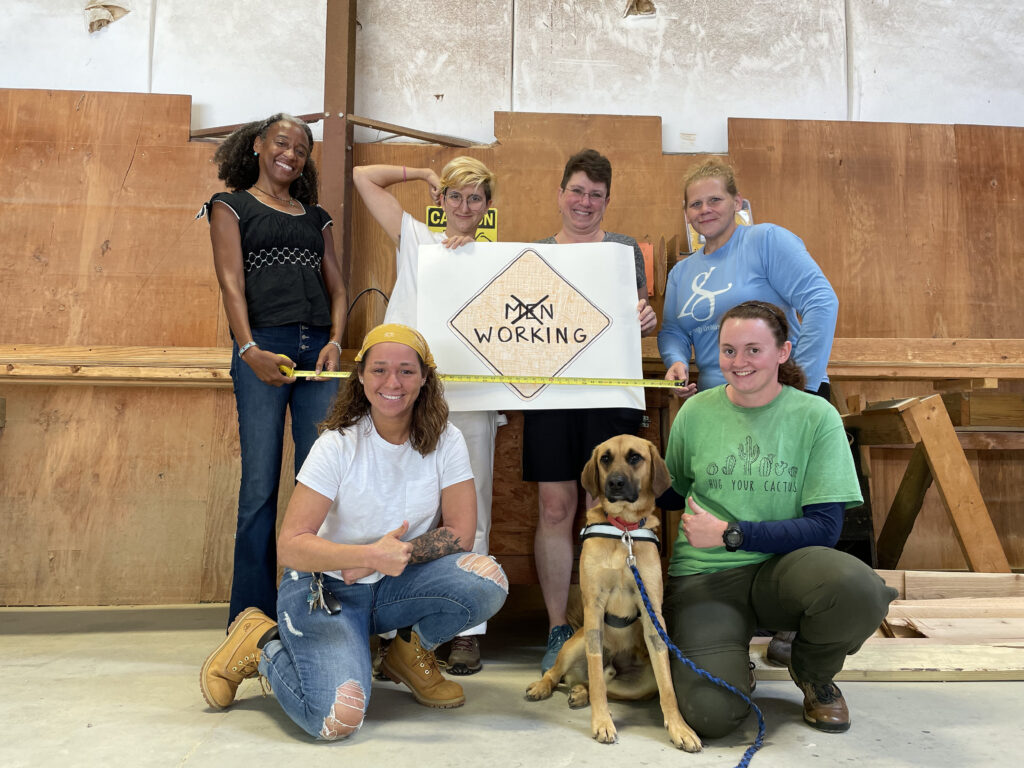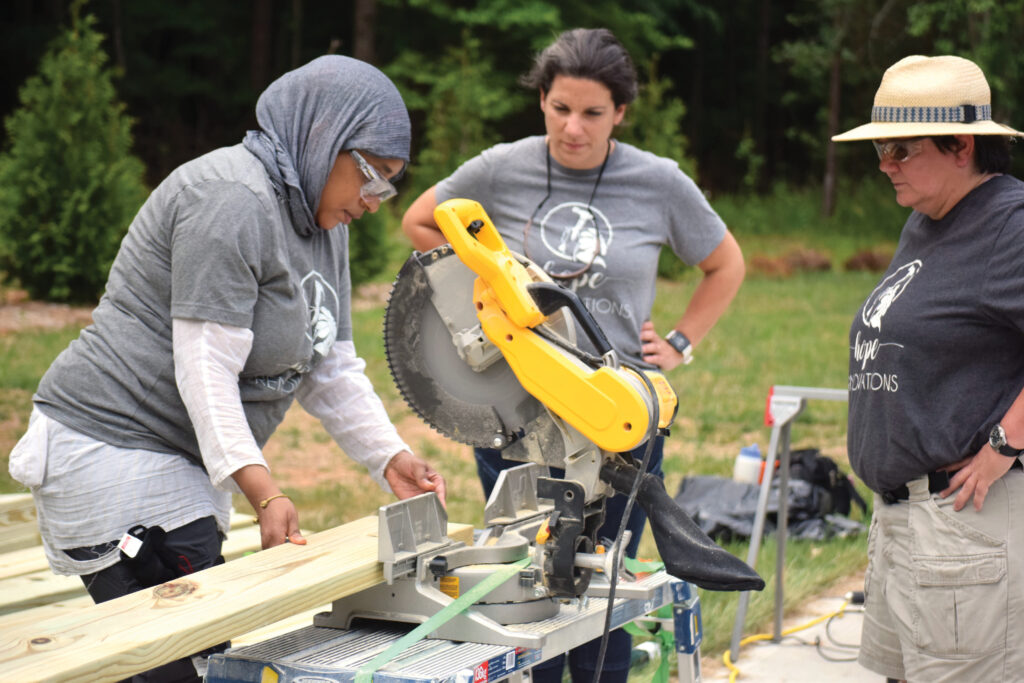Hope Renovations is offering women the skills they need to thrive in construction

Nora El-Khouri Spencer was on an impressive career trajectory by all accounts. But after spending years in executive positions at Lowe’s and IBM, she craved more meaning in her career. So she pivoted into social work. Her wheels spinning, she soon committed herself to maximizing her skill set and impact in the world.
Her vision became Hope Renovations, a nonprofit offering 15-week construction training and job placement courses that help people create better futures for themselves while serving seniors. Spencer was recently honored as a CNN hero, where she she explained:
“We envision a world where all women can support their families, and seniors can stay in their homes their whole lives.”
This is the vision Hope Renovations is making a reality. Its training program equips underemployed women and non-binary people with the skills to enter the trades or enroll in apprenticeships and continuing trades education.
“Construction is not an industry that women really see themselves in, in general,” says Spencer. “But we also have this belief that came from experiences in our lives that we would be good at it. Hope Renovations is proving that that instinct is true.”

Foreseeing the future of women working in construction
The seeds of Hope Renovations were planted when Spencer and her husband bought their first house. The foreclosure needed a lot of work. Spencer had always been crafty but never handy. As she now says with a laugh, “I was too cheap to hire people to do stuff for me when I bought my first home.”
Still, they brought in a contractor to redo a bathroom — a job that was botched. This only strengthened Spencer’s resolve to learn how to renovate. She had been keeping an eye on the contractor and realized she could learn many of these skills.
“I realized that I could do that stuff, and then decided I would start learning how to handle renovations. Not having enough money to hire somebody, we started doing them ourselves and it just snowballed.”
Spencer watched an electrician pull wire and change a fuse; she watched a plumber fix pipes. And then she went out and learned those skills herself. Nearly two decades later, the learning hasn’t stopped.
Spencer eventually took advantage of the Lowe’s employee discount to begin her journey into construction. “I started picking up power tools and getting my hands dirty in my off-time,” recalls Spencer. “As a woman, something about doing it myself was particularly rewarding. However, as I expanded my hobby and began working on small renovations alongside contractors and tradespeople, I began to wonder… where are all the women?”
After a decade in the corporate world, Spencer returned to school and earned a Master of Social Work degree from UNC Chapel Hill. While interning at a local homeless shelter, she realized that these women could be working in construction. “But when I would mention the trades as a potential career path,” says Spencer, “the answer I often got was ‘Nobody ever taught me to do that stuff. I always figured it was a man’s job.” During this time, Spencer became interested in the concept of social entrepreneurship. As she says, “I never realized the breadth of things that social workers do at the macro level, like big systems changes, and that really excited me.”
Suddenly her many worlds collided. What started out as a way to fix up her house became a means for empowering many women to gain meaningful employment in the field of construction.
Hope Renovations offer hands-on learning
Launched in June 2020, Hope Renovations quickly started taking off. Sixty-one women and non-binary people have already graduated from the nonprofit’s training program and the majority now work in the trades, each earning more than $15 per hour. The organization has received national acclaim, and has become so popular that they’re now working through a wait list. To keep up with demand, Spencer says they’ve recently adjusted the program.
“We realized we could be doing a better job of preparing folks for the industry. The more hands-on experience they get, the better — and not just from a skills perspective. It’s from a confidence perspective having had real-world experience, so they know what to expect on the job site.”
To better prepare trainees, Hope Renovation’s program has been extended to 15 weeks, which involves:
- An industry-recognized training curriculum developed by the National Center for Construction Research & Education
- Core skills in carpentry, electrical, plumbing, HVAC, and painting
- The basics of safety construction, materials, construction math, and blueprints
- An OSHA 10 certification, which covers general safety and health hazards protocols
- 9 weeks of classroom training with a $300 per week stipend
- 6 weeks on construction sites earning $15/hour
Post-training career skills development
Arianna Krajewski, a former sales agent who found her work unfulfilling, is a graduate of Hope Renovations. She wanted to find an occupation that would challenge her while feeding her need to work with her hands. After working as a lead installer at a solar installation company, she’s now an electrical apprentice thanks to the skills she learned at Hope.
“I was pulling my hair out. I absolutely hated it,” Krajewski says of her sales career. “So, I took a leap. I went towards solar, and I knew that my future was in the trades.”
Learning how to pull wire or renovate a bathroom is one thing. Landing a job is another. And so Hope Renovations offers a variety of developmental skills, such as communication, conflict resolution, resume and cover letter writing, and interviewing. Trainees are also connected with its peer-support network and community college advisors. All of these steps are important given the challenges trainees sometimes face.
“We understand that you can get all the hard skills you want,” Spencer says. “But if you’ve got barriers to employment, like transportation, or child care, or mental health, or whatever the case may be, you’re not going to be able to be successful as an employee. So we spend a lot of time working with folks on those barriers. We have women who come to us from traditionally underserved backgrounds; women who’ve come out of recovery or the prison system. Their barriers tend to be substantial and we’re able to help them with that.”
Three members of Hope Renovation’s staff also have a background in social work, making the organization particularly suited to navigate a variety of situations when trying to place graduates. Spencer has also made numerous industry connections, which eases the burden of job placement.
“We do mock interviews and resume writing, we have career events, and we have a lot of employers that we partner with for placement. We often recommend certain people for certain jobs. We connect certain employers that we know might be a fit, and we vet every employer. And we’re lucky to have them coming to us every single week begging for our trainees.”

The dignity of aging at home
Nora is also a Certified Aging in Place Specialist, which is another specialty that inspires Hope Renovations. Many senior citizens don’t want to move into nursing homes yet can’t afford necessary renovations. Spencer built these repair situations into her nonprofit model.
This also began with a personal experience: Spencer’s brother-in-law was diagnosed with rapidly-advancing multiple sclerosis, a disease that attacks the central nervous system, leaving some with disabilities. His beloved home was no longer safe. He didn’t have the money to make repairs, so he had to enter a nursing home — a fate that also affected some of her grandparents.
Spencer noticed that her grandmother who was able to age in place enjoyed a vastly better quality of life.
“The difference between aging at home and in a nursing home is remarkable,” Spencer says. “And there’s all kinds of data and research that back up the fact that outcomes are better if you’re able to stay where you want to as you age.”
The problem is that many construction companies won’t perform small jobs for older people. The profit margin just isn’t there, and many seniors don’t have the money to afford upgrades.
“That’s the reason that people can’t find contractors to come to put in a ramp or grab bars, or do a bathroom renovation and tub-to-shower conversion. It dawned on me that this was a great way to solve a couple of problems at once. We can get our trainees work so that they can sustain themselves, and while we’re at it, we can take care of a whole section of the population that doesn’t have enough help—and we can do it in a sustainable way.”
With this idea, all of Spencer’s worlds united: Hope trainees are employed in meaningful work while aging seniors stay home and reduce their need for Medicare and other services.
One success case is Thomas Merritt, who was born in 1947 and wanted to age in his longtime home in Chapel Hill. He contacted Hope and is extremely pleased with the results.
“It’s been a joy because of the relationships we have with the ladies who’ve been working on the house, and how friendly they are and how attentive they are to attention to detail,” Thomas says.
As his wife, Lola, says, “If I were younger, I would sign up for Hope.”
Spreading Hope across the country
Spencer’s vision is positively impacting the lives of the underserved communities she set out to help.
““Our homes, our schools, our communities, our neighbors, they need us and we need these opportunities,” she said in her CNN Heroes award speech.

Spencer plans on expanding Hope Renovations by extending the training program and paying trainees more. She also wants to see nationwide programs, likely beginning in the Chapel Hill region.
“We’re talking to a couple of community colleges,” she says. “We want to take our training program and put it in their facility, because that way we don’t have to go to the trouble and expense of creating a brand new workshop for every program. It would be great to use what colleges already have on hand.”
Limited physical space at Hope Renovation’s headquarters is a large part of the reason they maintain a waiting list. Demand creates supply, however. Whether through partnerships with colleges, trade schools, or even local businesses, Spencer is optimistic that Hope Renovations will continue to scale and provide more people with a chance to find a career that they love, and which will support their families.
“You could put this program anywhere,” Spencer says. “Women need these jobs. Seniors need this help.” The national recognition that we’ve gotten is the coolest thing, but we now have people contacting us from all over the world. I just had a guy reach out from Ghana a couple weeks ago and say, ‘How do we get Hope Renovations where we are?’ There’s really a desire and a need for this.”
Learn more about Stand Together’s economic progress efforts.
/

